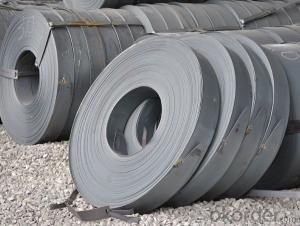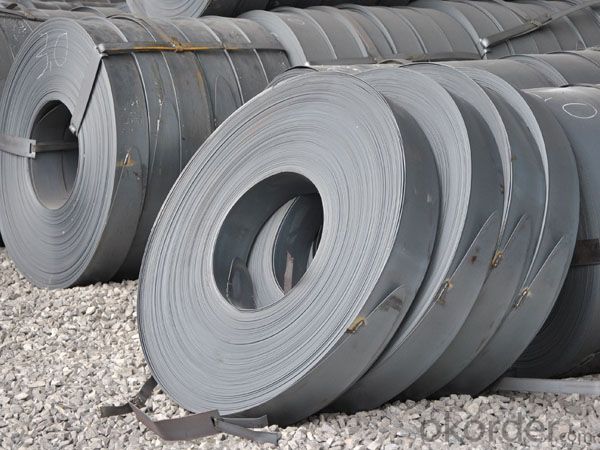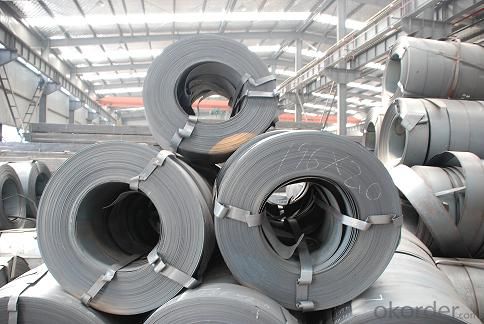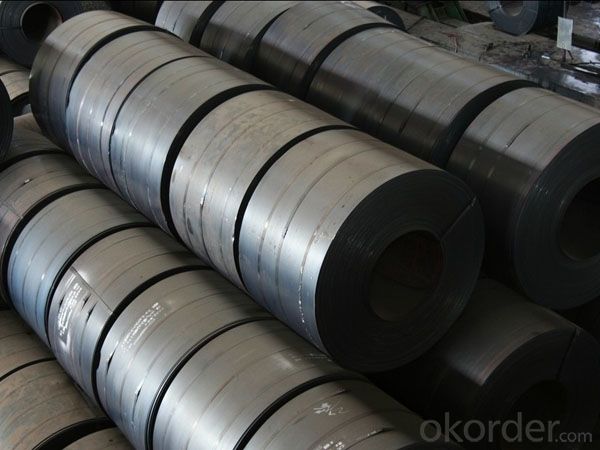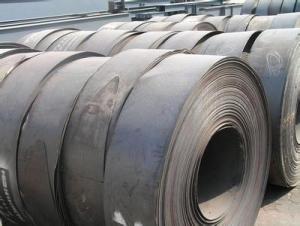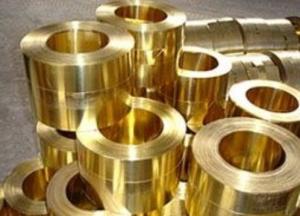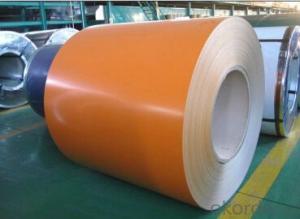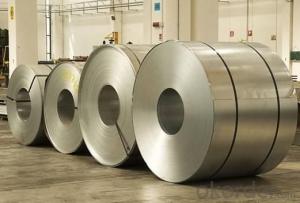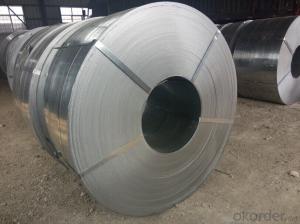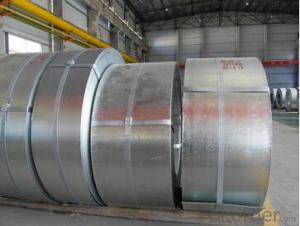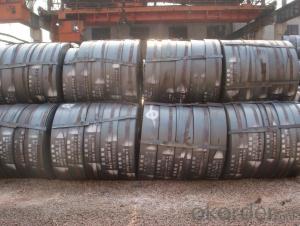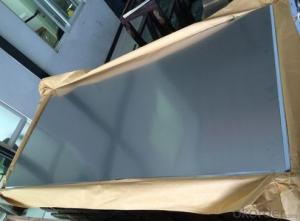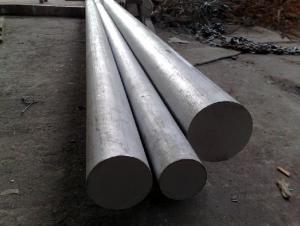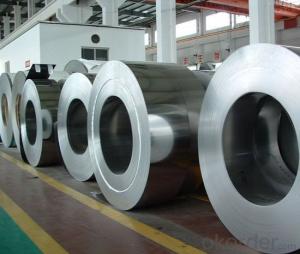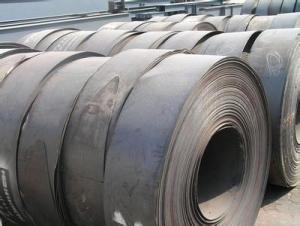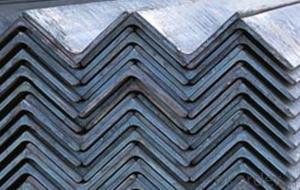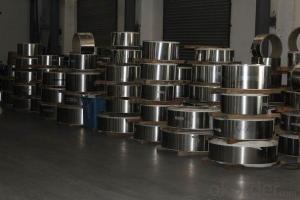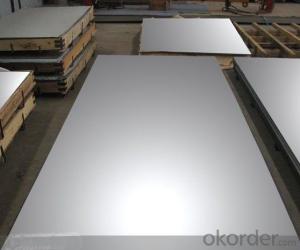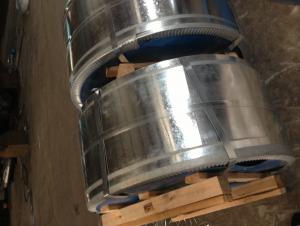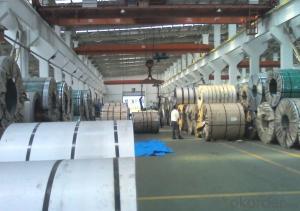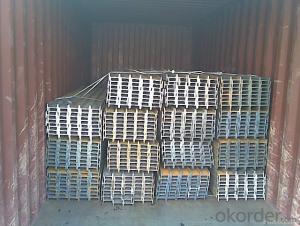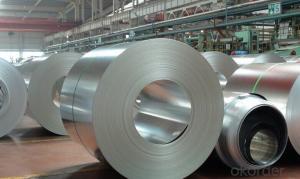High grade hot rolled narrow strip steel
- Loading Port:
- Tianjin
- Payment Terms:
- TT OR LC
- Min Order Qty:
- 300 m.t.
- Supply Capability:
- 5000 m.t./month
OKorder Service Pledge
OKorder Financial Service
You Might Also Like
Definition
Edit
Strip steel
The strip generally supplied in rolls, has the advantages of high size precision,good surface quality, easy processing, material saving etc.. With the same steel plate, strip by strip material is divided into ordinary and high quality strip steel two categories; according to the manufacturing method of hot rolled strip,cold rolled strip two.
2 scope of application
Edit
Steel is widely used in the production of welded steel pipe as blank, cold-formed steel, manufacturing bicycle frame, wheels, clamps, washer, spring film,saw blade, metal products and blade etc..
Cold-formed steel
In broadband steel
The 3 process
Edit
The production process of cold rolled strip steel is generally: picklinglubrication, rolling, process, anneal and flat, cutting, packaging.
Cold rolled strip steel pickling rolling process: -- -- -- -- the size of synchronousrolling annealing lubricating antirust oil length -- -- -- flat polished package
Hot strip rolling heating furnace dephosphorization machine: -- -- -- --phosphorus removal roughing mill machine finishing mill surface quality inspection instrument -- -- -- -- layer cold coiler bundling machine -- number spraying machine -- volume base slab
The production process of hot rolling strip steel: first in the heating furnace of increasing the temperature to the desired temperature of rolling, and then oxidized to tin machine generated on the slab roller into the roughingphosphorus removal treatment, then enter the width and thickness of striproughing rolling unit rolling, iron oxide by roller conveying to phosphorus on the strip surface finishing machine produce processing, enter the width and thickness of strip finishing rolling unit for more precision rolling, strip by rollerby layer on the surface temperature of cold roll strictly control take before and after, enters the coiler for steel coil finally bundling, spraying number into thevolume storage packaging.
4 Market
Edit
In May 20th Shengfang steel prices down. According to the data Chineseindustry insight network show: Hebei forward, Sheng Bao, Bazhou Xinya, the new crown made 2.5* (232-355) steel price is 3400 yuan (ton price, the same below), down 50 yuan more than last Friday.
Influenced by Tangshan last week, small narrow billet prices, Saturday (18 days) in Shengfang area with steel mills have lowered the ex factory price. The price decline, turnover performance in general, opened today manufacturersoffer temporary stability. In addition, the Tangshan area steel prices also have lowered, 355mm strip retail pricing million in 3320-3350, with the local price difference between 50-80 yuan, relatively reasonable.
Today Tangshan small narrow band market prices show small to rise, and the futures, electronic disk also rise, but the rise of strength are insufficient. At present, the overall trend of steel spot market downturn, but the steel market is restricted by the supply pressure, the market price is the emergence of the continuing rise in prices. And will soon enter the consumer off-season, terminaldemand release rate has slowed down, expected short-term local steel marketprice is still dominated by the shock consolidation.
5 Classification
Edit
Hot rolled strip
1, hot rolled ordinary carbon structural steel (GB3524-83)
Strip steel
Hot rolled plain carbon steel with ordinary carbon structural steel as material,made of 1.80-6.00mm hot rolled strip thickness, width of 50-1200mm.
(1) the main purposes
Mainly used for cold rolling billet, cold-formed steel billet, welded steel pipebillet and bicycle, hardware products manufacturing.
(2) grade and chemical composition of materials
Standards and grades
National standard
Quite foreign standard
Function and use
Material categories
The implementation of standards
Grade
Standard No.
Grade
Suitable for manufacturing of cold forming parts
Low carbon steel coil
Q/BQB302
SPHC
JISG3131
SPHC
SPHD
SPHD
SPHE
SPHE
SAE1006/SAE1008
SAE1006/SAE1008
XG180IF/200IF
XG180IF/200IF
Steel for general structure
GB/T912-1989
Q195
JISG3101
SS330
For general construction of buildings, bridges, ships, vehicles, etc.
Q235B
SS400
SS400
SS490
ASTMA36
SS540
(3) the mechanical properties
The nominal thickness
The yield strength (Mpa)
Tensile strength (Mpa)
Elongation of A50mm%
The 180 degree bend test
>1.5-2.5
Less than or equal to 290
More than 310
More than 38
D=0a
>2.5-3.0
Less than or equal to 290
More than 300
More than 38
D=0a
>3.0-4.0
Less than or equal to 290
More than 300
More than 40
D=1/2a
Use of hot-rolled steel 2, bicycle (GB3645-89)
Bicycle for hot rolled wide strip steel in carbon steel and low alloy steel asmaterial, made of 1.8-8.0mm strip steel thickness after hot rolling, the strip width can reach 1300mm.
(1) the main uses special for bicycle manufacturing materials.
(2) grade and chemical composition of materials
(3) the mechanical properties
(4) strip (board) size
The thickness of the steel plate strip thickness 1.8-6.0mm, 7, 8.0mm.
Strip (board) width: rimming steel is less than or equal to 1300mm (a=2.0-6.0)
Killed steel is less than or equal to 1250mm (a = 3)
Less than or equal to 1300mm (a = 3)
The length of the plate, steel coil diameter 760mm, 4-6m plate.
Hot rolled strip with 3, bicycle (GB3647-89)
(1) the main purposes
Bicycle designed for the manufacture of hot rolled strip of bicycle and the chain, also can be used for cold rolled and welded pipe blank blank.
(2) grade and chemical composition of materials
(3) the mechanical properties
(4) the specification of strip
Bicycles are generally used for hot rolled strip steel strip thickness of 1.8-8.0mm, width of 60-250mm.
Hot rolled strip with 4, pressure vessel (GB5681-85)
(1) the main purposes
Used in the manufacture of low pressure vessel.
(2) grade and chemical composition of materials
(3) the mechanical properties
(4) the specification of strip and production unit
Pressure vessel is generally used for hot rolled strip steel strip thickness of 4mm, width of 80mm double length, length of not less than 70m (volume).
Cold rolling of strip
(1) the main purposes
Cold-rolled carbon steel for the manufacture of bicycles, sewing machines,agricultural machinery and other accessories and hardware products.
(2) grade and chemical composition of materials
Grade
Supply standard
Supply size
Use
SPCC
Q195
Q235-B
GB/T912
GB/T3274
Width
Mm
Thickness
Mm
Widely used in engineering machinery, transportation machinery, construction machinery, hoisting machinery。
- Q: How are steel strips used in the aerospace industry?
- Steel strips are commonly used in the aerospace industry for various applications such as manufacturing aircraft components, structures, and fasteners. These strips are often used to create lightweight yet strong parts, ensuring the overall safety and performance of the aircraft. They can be shaped, cut, and formed into different profiles to meet specific design requirements. Additionally, steel strips are utilized in the production of critical aerospace equipment like landing gear, engine components, and structural supports, where high strength and durability are crucial.
- Q: What are the different surface embossing methods for steel strips?
- Steel strips can be embossed using different methods, each with its own unique characteristics and applications. Some common methods include: 1. Roll embossing, which involves passing the steel strip through embossing rolls engraved with a pattern. The rolls press against the strip, creating a raised design. This versatile method offers a wide range of patterns. 2. Heat embossing, where the steel strip is heated and pressed against an embossing tool. The heat softens the steel, allowing it to take the shape of the tool. This method is used for intricate and detailed patterns. 3. Chemical embossing, which uses chemicals to etch a pattern onto the steel strip. The chemicals dissolve the metal selectively, leaving behind the desired design. This method is commonly used for logos, text, or simple patterns. 4. Laser embossing, where a focused laser beam melts or evaporates the metal to create a raised pattern. This method offers high precision and allows for intricate designs. 5. Mechanical embossing, which uses tools like punches or hammers to physically deform the steel strip and create a raised pattern. This method is cost-effective for simple designs. Each method has advantages and limitations, and the choice depends on factors like the desired pattern, complexity, cost, and steel strip properties.
- Q: How are steel strips coated with zinc?
- Galvanization is the process by which steel strips are coated with zinc. There are two primary methods utilized for this purpose: hot-dip galvanization and electro-galvanization. In hot-dip galvanization, the steel strips are submerged in a bath of molten zinc at a temperature of approximately 450 degrees Celsius (842 degrees Fahrenheit). The strips are carefully cleaned to eliminate impurities and undergo several pre-treatment stages, including acid pickling and fluxing, to improve the adhesion of the zinc coating. Once adequately prepared, the strips are immersed in the molten zinc bath, where a reaction occurs between the zinc and the steel surface, resulting in the formation of a protective layer. This zinc coating adheres firmly to the steel and provides exceptional resistance against corrosion. On the other hand, electro-galvanization is a process that entails applying a thin layer of zinc onto the steel strips through electroplating. Initially, the strips are cleaned and then submerged in an electrolyte solution containing zinc ions. An electric current is passed through the solution, causing the zinc ions to be attracted to and deposited onto the steel surface. This method allows for a more precise and controlled coating thickness, making it suitable for applications that require a thinner coating. Both hot-dip galvanization and electro-galvanization are effective techniques for coating steel strips with zinc, resulting in a protective layer that significantly enhances their durability and corrosion resistance. The choice between the two methods depends on various factors, including the desired coating thickness, specific application requirements, and cost considerations.
- Q: How are steel strips processed for interlocking?
- To achieve interlocking, steel strips undergo a series of steps involving precision cutting, shaping, and assembly. It all begins with selecting high-quality steel strips that meet the necessary specifications. These chosen strips are then cut into specific lengths and widths using advanced cutting techniques like shearing or laser cutting. After the initial cutting, further processing may be done to create interlocking features. This can involve shaping the edges of the strips to form interlocking profiles or adding specialized notches or grooves that allow for secure connections. Machining techniques like milling or grinding might be employed to achieve the desired interlocking design. Once the interlocking features are formed, the steel strips undergo careful inspection to ensure accuracy and quality. Any imperfections or burrs are removed through deburring or polishing processes to guarantee smooth and precise interlocking. The final step in processing steel strips for interlocking is assembly. The interlocking profiles of the strips are meticulously aligned and joined together using welding, riveting, or other suitable methods. This assembly process ensures that the interlocking steel strips create a strong and secure connection capable of meeting the requirements of the intended application. In summary, the process of processing steel strips for interlocking involves a combination of cutting, shaping, and assembly techniques to create precise interlocking profiles. This guarantees that the resulting interlocking system offers a reliable and durable solution for various applications such as construction, manufacturing, or infrastructure projects.
- Q: How are steel strips protected against moisture?
- Steel strips are protected against moisture through various methods such as applying coatings, galvanizing, or using moisture-resistant packaging materials. These protective measures prevent direct contact between the steel and moisture, thereby minimizing the risk of corrosion and maintaining the integrity of the steel strips.
- Q: How do steel strips perform in flexible assemblies?
- Steel strips perform well in flexible assemblies as they offer strength, durability, and resistance to deformation. Their inherent flexibility allows them to bend and conform to various shapes and curves without compromising their structural integrity. This makes them suitable for applications that require flexibility, such as automotive components, electrical enclosures, and architectural structures.
- Q: What are the main factors affecting the fire resistance of steel strips?
- The main factors affecting the fire resistance of steel strips are the thickness and composition of the steel, the presence of any protective coatings or insulation, the exposure temperature and duration, and the structural design and arrangement of the steel components.
- Q: How are steel strips coated with a metallic coating?
- Steel strips can be coated with a metallic coating through a process called hot-dip galvanization. In this process, the steel strips are immersed in a bath of molten zinc, allowing the zinc to adhere to the surface of the steel. The strips are then removed from the bath and cooled, resulting in a durable and corrosion-resistant metallic coating on the steel.
- Q: How are steel strips tempered for improved toughness?
- To enhance toughness, steel strips undergo a heat treatment process known as tempering. This involves heating the strips to a specific temperature, typically ranging from 300 to 700 degrees Celsius, and then rapidly cooling them. Depending on the desired level of toughness, the cooling is achieved by quenching the steel in oil, water, or air. During the heating stage, the steel strips undergo a transformation called austenitization, which alters their crystal structure. This results in the formation of martensite, a hard and brittle phase. However, martensite lacks toughness and is prone to cracking under stress. To enhance toughness, the steel strips are then subjected to tempering. This involves reheating them to a lower temperature, typically between 150 and 300 degrees Celsius, and holding them at that temperature for a specific duration. This allows the martensite to transform into tempered martensite, which is more ductile. Tempering helps relieve internal stresses, reduce brittleness, and improve toughness and ductility in the steel strips. It also enables the adjustment of the final mechanical properties according to the specific requirements of the application. In summary, steel strips are tempered to improve toughness by undergoing a carefully controlled heat treatment process. This transforms the hard and brittle martensite phase into a more ductile tempered martensite phase, ensuring that the strips possess the desired combination of hardness and toughness for different industrial applications.
- Q: What are the different surface plating options for steel strips?
- There are several surface plating options available for steel strips, including zinc plating, nickel plating, chrome plating, tin plating, and copper plating. Each option provides unique benefits such as corrosion resistance, improved aesthetics, enhanced conductivity, or increased durability, allowing for customization based on the specific requirements and applications of the steel strips.
Send your message to us
High grade hot rolled narrow strip steel
- Loading Port:
- Tianjin
- Payment Terms:
- TT OR LC
- Min Order Qty:
- 300 m.t.
- Supply Capability:
- 5000 m.t./month
OKorder Service Pledge
OKorder Financial Service
Similar products
Hot products
Hot Searches
Related keywords
